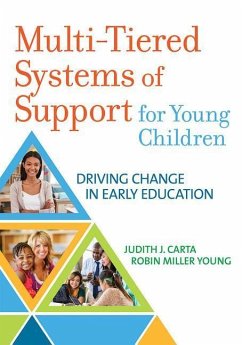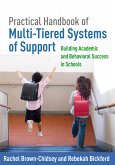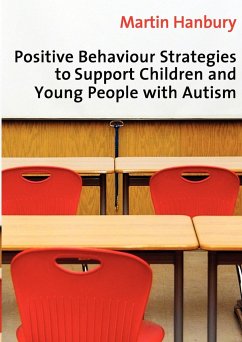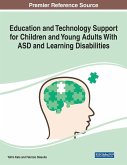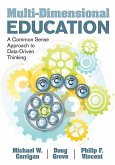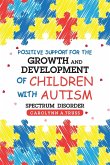Judith Carta, Robin Miller Young
Multi-Tiered Systems of Support for Young Children
Driving Change in Early Education
Judith Carta, Robin Miller Young
Multi-Tiered Systems of Support for Young Children
Driving Change in Early Education
- Broschiertes Buch
- Merkliste
- Auf die Merkliste
- Bewerten Bewerten
- Teilen
- Produkt teilen
- Produkterinnerung
- Produkterinnerung
Addresses the process of designing, implementing, and ensuring sustainability of multi-tiered systems of support (MTSS) in early education settings. Chapters provide background about MTSS as well as descriptions of evidence-based practices designed to reduce the achievement gap before children enter kindergarten.
Andere Kunden interessierten sich auch für
![Practical Handbook of Multi-Tiered Systems of Support Practical Handbook of Multi-Tiered Systems of Support]() Rachel Brown-ChidseyPractical Handbook of Multi-Tiered Systems of Support52,99 €
Rachel Brown-ChidseyPractical Handbook of Multi-Tiered Systems of Support52,99 €![Positive Behaviour Strategies to Support Children & Young People with Autism Positive Behaviour Strategies to Support Children & Young People with Autism]() Martin HanburyPositive Behaviour Strategies to Support Children & Young People with Autism56,99 €
Martin HanburyPositive Behaviour Strategies to Support Children & Young People with Autism56,99 €![Education and Technology Support for Children and Young Adults With ASD and Learning Disabilities Education and Technology Support for Children and Young Adults With ASD and Learning Disabilities]() Education and Technology Support for Children and Young Adults With ASD and Learning Disabilities180,99 €
Education and Technology Support for Children and Young Adults With ASD and Learning Disabilities180,99 €![Building Sensory Friendly Classrooms to Support Children with Challenging Behaviors Building Sensory Friendly Classrooms to Support Children with Challenging Behaviors]() Rebecca A MoyesBuilding Sensory Friendly Classrooms to Support Children with Challenging Behaviors18,99 €
Rebecca A MoyesBuilding Sensory Friendly Classrooms to Support Children with Challenging Behaviors18,99 €![Marvelous English Multi-Purpose Guide Marvelous English Multi-Purpose Guide]() Avtar S. VirdiMarvelous English Multi-Purpose Guide20,99 €
Avtar S. VirdiMarvelous English Multi-Purpose Guide20,99 €![Multi-Dimensional Education Multi-Dimensional Education]() Michael W. CorriganMulti-Dimensional Education35,99 €
Michael W. CorriganMulti-Dimensional Education35,99 €![Positive Support for the Growth and Development of Children with Autism Spectrum Disorder Positive Support for the Growth and Development of Children with Autism Spectrum Disorder]() Carolynn A. TrussPositive Support for the Growth and Development of Children with Autism Spectrum Disorder14,99 €
Carolynn A. TrussPositive Support for the Growth and Development of Children with Autism Spectrum Disorder14,99 €-
-
-
Addresses the process of designing, implementing, and ensuring sustainability of multi-tiered systems of support (MTSS) in early education settings. Chapters provide background about MTSS as well as descriptions of evidence-based practices designed to reduce the achievement gap before children enter kindergarten.
Hinweis: Dieser Artikel kann nur an eine deutsche Lieferadresse ausgeliefert werden.
Hinweis: Dieser Artikel kann nur an eine deutsche Lieferadresse ausgeliefert werden.
Produktdetails
- Produktdetails
- Verlag: Brookes Publishing Company
- Seitenzahl: 304
- Erscheinungstermin: 20. September 2018
- Englisch
- Abmessung: 251mm x 178mm x 15mm
- Gewicht: 499g
- ISBN-13: 9781681251943
- ISBN-10: 1681251949
- Artikelnr.: 51510575
- Herstellerkennzeichnung
- Libri GmbH
- Europaallee 1
- 36244 Bad Hersfeld
- gpsr@libri.de
- Verlag: Brookes Publishing Company
- Seitenzahl: 304
- Erscheinungstermin: 20. September 2018
- Englisch
- Abmessung: 251mm x 178mm x 15mm
- Gewicht: 499g
- ISBN-13: 9781681251943
- ISBN-10: 1681251949
- Artikelnr.: 51510575
- Herstellerkennzeichnung
- Libri GmbH
- Europaallee 1
- 36244 Bad Hersfeld
- gpsr@libri.de
Dr. Allison J. Metz is a developmental psychologist, Director of the National Implementation Research Network (NIRN), and Senior Implementation Specialist at the Frank Porter Graham Child Development Institute at The University of North Carolina at Chapel Hill. Dr. Metz specializes in the implementation, mainstreaming, and scaling of evidence to achieve social impact for children and families in a range of human service and education areas, with an emphasis on child welfare and early childhood service contexts. Her work focuses in several key areas including the development of evidence-informed practice models; the use of effective implementation and scaling strategies to improve the application of evidence in service delivery systems; and the development of coaching, continuous quality improvement, and sustainability strategies. She is Co-Chair for the Global Implementation Conference, a part of the Global Implementation Initiative. Dr. Metz is co-editor of Applying Implementation Science in Early Childhood Programs and Systems (with T. Halle & I. Martinez-Beck; Paul H., Brookes Publishing Co., 2013). Arnold Olszewski is an Assistant Professor and speech-language pathologist in the Department of Speech Pathology and Audiology at Miami University. His research focuses on developing feasible, evidence-based language and literacy interventions for young children. Dr. Olszewski's research has been published in various journals and presented at national conferences. Deanna Pearce Law has served as a school psychologist since 2005 in a number of schools across Canada and in the U.S. She completed her M.Ed at the University of British Colombia in Vancouver, Canada. Deanna continued her studies in early childhood at the University of Colorado Denver where she completed her doctorate in Education Leadership for Educational Equity. Her dissertation research focused on multi-level systems implementation of evidence-based practices in early childhood education and the Pyramid Model for Supporting Social Emotional Competence in Infants and Young Children. She is currently working as an independent consultant in Omaha, NE and enjoys time with her 18 month old daughter Laya Faye, and husband Derek Law. Lindsey Peters-Sanders is a doctoral candidate in the Department of Communication Sciences and Disorders at the University of South Florida. Her research focuses on implementing supplemental language and early literacy instruction that applies a Multi-tiered System of Support framework in preschools serving at-risk children. Joy C. Polignano, Ph.D., NCSP, earned her doctoral degree and national certification in school psychology from Lehigh University before completing a U.S. Department of Education Institute of Education Sciences (IES) postdoctoral fellowship with the Anita Zucker Center for Excellence in Early Childhood Studies at the University of Florida. She has worked as an early care and education teacher and has been actively involved in the implementation of four, large-scale IES randomized-controlled efficacy studies designed to promote the social-emotional competence and pre-academic skill development of young children with or at risk for disabilities. She currently serves as an early intervention school psychologist in Pennsylvania. Kelly A. Powell-Smith, Ph.D., NCSP, is Vice President and Associate Director of Research & Development at Dynamic Measurement Group. Dr. Powell-Smith, a nationally certified school psychologist, obtained her doctorate in school psychology from the University of Oregon. She is a former Associate Professor of School Psychology at the University of South Florida. She was a faculty associate of the Florida Center for Reading Research (FCRR) and a consultant with the Eastern Regional Reading First Technical Assistance Center (ERFTAC). She has provided training in formative assessment and academic interventions in 22 states and Canada. Over the past 25 years, Dr. Powell-Smith has conducted research related to children with various learning and behavioral difficulties and has conducted over 225 national, state, and regional workshops and presentations. Dr. Jennifer Schroeder is a clinical child psychologist with over 15 years of experience consulting to nonprofit, education, government, and philanthropic organizations to improve and sustain effective programs and services for children, youth, and families. She is the founder and president of The Implementation Group, a strategic planning and evaluation firm that supports effective implementation practices in human services and education. She holds a doctorate in clinical child psychology from Bowling Green State University and completed pre- and postdoctoral fellowships at Yale University. Susan M. Sheridan, Ph.D., is Director of the Nebraska Center for Research on Children, Youth, Families and Schools (CYFS), and a George Holmes University Professor of Educational Psychology at the University of Nebraska-Lincoln. Dr. Sheridan&s research is focused on parent-teacher relationships; the development of meaningful home-school partnerships; early childhood education and interventions; rural education; and interventions promoting childrenâ (TM)s social skills, social-emotional development and behavioral competencies. Dr. Sheridan has published more than 100 books, chapters, and refereed journal articles on these and related topics. Noteworthy awards include the American Psychological Associationâ (TM)s Division 16 (School Psychology) Lightner Witmer Award (1993) for early career accomplishments and the Senior Scientist Award (2015) for distinguished career-long scholarship, the 2005 Presidential Award from the National Association of School Psychologists, and the 2014 University of Nebraskaâ (TM)s Outstanding Research and Creativity Award. Dr. Smith received her master's degree in early childhood special education and doctorate in special education and public policy from the University of North Carolina at Chapel Hill. Her areas of interest include early childhood special education/early intervention policies, systems and program development; leadership and collaboration; and the scaling up of evidence-based practices. Dr. Smith has held early childhood and early childhood special education positions for the past thirty five years including early childhood teacher, Executive Director of the Division for Early Childhood (DEC) of the Council for Exceptional Children; Policy Specialist, Council for Exceptional Children (CEC); and Program Specialist, Office of Special Education Programs, US Department of Education. She has served as a consultant on state and national early childhood policy, expert witness in right to treatment litigation, prepared and delivered legislative testimony to the Congress as well as state legislatures, and has worked with many parent and professional groups in their state policy efforts. In an effort to help shape quality inclusive early childhood environments for all children, including those with special needs, she has worked closely for many years with NAEYC and other early childhood leadership organizations including serving on the NAEYC Commission to develop the current program accreditation criteria. Dr. Smith has authored over 20 peer-reviewed journal articles, and 15 books and chapters one of which was the first book for administrators on preschool inclusion: The Administrator's Policy Handbook for Preschool Mainstreaming (1993). She also chaired the most recent effort to establish the DEC Recommended Practices in Early Intervention/Early Childhood Special Education to help guide the field in improving services for young children with special needs, their families and those who work with them. She is currently Co-Principal Investigator of an OSEP funded doctoral program at UCD in early intervention and early childhood special education policy and collaborative leadership, and is involved in the OSEP funded national Early Childhood Technical Assistance Center (ECTA). She is the recipient of several awards and honors. Xigrid Soto is a doctoral candidate in the Department of Communication Sciences and Disorders at the University of South Florida. She works under the mentorship of Dr. Howard Goldstein, whose area of specialty includes the provision of preventative early literacy and language interventions to at-risk preschoolers living in poverty. Her research focuses on the delivery of early literacy interventions for Latino preschoolers who are Dual Language Learners. Phillip Strain, Ph.D., is James C. Kennedy Endowed Chair in Urban Education at the Morgridge College of Education and Director of the Positive Early Learning Experiences Center at the University of Denver. Dr. Strain is the author of more than 300 professional papers that have focused on young children with autism, prevention of challenging behavior, and inclusion practices. In his 4 decades in the field, he has been a teacher, early intervention program administrator, and university professor. Dr. Strainâ (TM)s research on challenging behavior and autism has received more than $80 million dollars in grant support, and this work has garnered multiple career achievement awards. Alisha Wackerle-Hollman, Ph.D. is an educational psychologist whose research addresses both development of English, Spanish and Hmong early literacy and language measures for preschool age students, as well as the design and evaluation of parent education programs. She is the co-director of the IGDIlab, a research lab at the University of Minnesota where she has secured over $5M in funding since 2012. Dr. Wackerle-Hollman's work focuses on measurement systems designed to evaluate progress on language and literacy in English and Spanish speaking preschoolers, and the adaptation of these measures for use on tablet devices. She is specifically interested in using data from these measurement platforms to support effective data-based decision making in the context of multi-tiered systems of support. Jaclyn (Jackie) D. Joseph, Ph.D., BCBA-D, is Executive Director at the Rise School of Denver, Colorado. Dr. Joseph has been involved in research and technical assistance for the LEAP Model, Pyramid Model, Prevent-Teach-Reinforce for Young Children, and Prevent-Teach-Reinforce for Families. Dr. Josephâ (TM)s professional and research interests include young children with challenging behavior and interventions for improving their social-emotional competence. She also is dedicated to promoting and advocating for high-quality inclusive early care and education opportunities for all young children, and especially for her determined, strong, and amazing little girl who has a rare genetic syndrome. Judith J. Carta, Ph.D., is a Senior Scientist in the Institute for Life Span Studies, Professor of Special Education, and the Interim Director of the Juniper Gardens Children's Project at the University of Kansas. Her research focuses on developing strategies to minimize the effects of poverty on children's outcomes, designing practices that teachers and parents can use to promote children's early learning and social-emotional development, methods for monitoring the progress of young children, and strategies for promoting family engagement in early intervention programs. She has been the PI of several multi-site research projects and centers funded by the National Institutes of Health, the Institute of Educational Sciences, and the Administration on Children and Families. She currently co-directs an IES-funded project to develop the Infant-Toddler Pyramid Model, a three-tiered model to promote social-emotional outcomes for infants and toddlers, based on the TPITOS. She was a member of the Federal Advisory Panel on Head Start Research and Evaluation, Division of Early Childhoodâ (TM)s Commission on Recommended Practices, and served as the Editor of Topics in Early Childhood Special Education as well as the boards of numerous scientific journals. She received the Mary E. McEvoy Service to the Field Award from the Division for Early Childhood. Robin Miller Young, Ed.D., NCSP is currently an Assistant Professor of Early Childhood Education at Northern Illinois University where she prepares future teacher leaders to employ evidence-based practices to identify assets and meet the needs of children and families. Prior to her present position, Dr. Young guided development of MTSS frameworks while serving on classroom and administrative leadership teams at Prairie Children Preschool (Aurora, IL). The community preschool has operated as an ECE/ECSE blended program since 1998 and has won awards for developing and operating system-wide practices that effectively integrate early learning and social-emotional tiered-instructional models. Her professional partnership work includes direct services and consultative supports for moving programs into MTSS frameworks, and ensuring professional pre-service and in-service training and licensure efforts to create a workforce prepared to provide effective and efficient services in this framework. Dr. Young's scholarship includes grant-funded work resulting in numerous presentations, published curricula, book chapters, and data-based and practitioner-oriented articles. She is currently examining methods to prepare EC educators to design and deliver multi-week, inter-disciplinary instructional units that develop childrenâ (TM)s vocabulary skills within proactive social-emotional settings. Dr. Young is also examining preparation of directors/principals and teacher-leaders who can engage in leadership behaviors that will continue moving early learning programs into effective and efficient MTSS frameworks. Dr. Mary Abbott is a research scientist focusing in areas of literacy instruction. Her research areas of interests include: preschool, K-12, and adult literacy instruction and implementation, literacy assessment, RTI/MTSS, and teacher professional development. Katherine Bravo Aguayo is a professional development specialist and senior research assistant with Dynamic Measurement Group. She has worked with students in grades pre-K through high school in a variety of research and educational settings for the past decade and is co-author of the Preschool Early Literacy Indicators (PELI), a measure of early literacy skills. She earned her master's degree in special education with an emphasis in early intervention from the University of Oregon where her research interests included dual language development and educational supports for children with autism spectrum disorder. Lynette retired from Northern Illinois University where she taught courses in early intervention (EI) and early childhood special education (ECSE) and served as the Program Coordinator for Special Education. She currently works as a consultant for a variety of EI/ECSE grant-funded projects. She is a past-president of the Division for Early Childhood and serves as a member of the Editorial Board for several EI/ECSE focused journals. Lillian Durán, has a Ph.D. in Educational Psychology from the University of Minnesota and is currently an Associate Professor in the Department of Special Education and Clinical Sciences at the University of Oregon. Her research focuses on improving instructional and assessment practices with preschool-aged dual language learners (DLLs). She is currently a Co-Principal Investigator on an IES Goal 5 measurement grant to develop a Spanish version of the Individual Growth and Development Indicators (S-IGDIs) an early language and literacy general outcome measure for screening and progress monitoring in preschool. Dr. Lise Fox is a professor in the Department of Child and Family Studies at the University of South Florida in Tampa, Florida, and is Co-Director of the Florida Center for Inclusive Communities: A University Center for Excellence in Developmental Disabilities. Dr. Fox is one of the developers of the Pyramid Model for Promoting Social Emotional Competence in Infants and Young Children and has authored 95 books, book chapters, and articles. She has developed and managed numerous technical assistance, research, model demonstration, and personnel preparation projects in the areas of early childhood special education, state capacity building, implementation of the Pyramid Model, preventing and addressing challenging behavior, and Positive Behavior Support. She is the director of the National Center for Pyramid Model Innovations. Howard Goldstein, Ph.D., CCC-SLP, is a nationally known scholar in the field of child language intervention research and the author of two books and more than 100 scholarly articles. His recent work has sought to enhance the language and literacy development of students in high poverty schools who are at high risk for language and reading disabilities. A certified speech-language pathologist and former ASHA Vice President for Science and Research, Dr. Goldstein is currently Associate Dean of Research and Professor of Communication Sciences and Disorders in the College of Behavioral and Community Sciences at University of South Florida in Tampa. Charles Greenwood is a doctoral graduate of the University of Utah. Former Director of the Juniper Gardens Children's Project, he is an accomplished researcher and author of behavioral and educational research and practice focused on children and families in low income communities. His current research is focused on early childhood applications and issues of the MTSS/RTI approach to instruction and services. Dr. Jessica K. Hardy is currently Assistant Professor in the Department of Special Education at the University of Illinois at Urbana-Champaign. Dr. Hardy received her doctorate in early childhood special education from Vanderbilt University and her M.Ed. and BA from the University of Florida. She taught in Portland, Oregon, as a Head Start teacher and an early childhood special education teacher. Dr. Hardyâ (TM)s primary research interests are evidence-based instructional practices and early childhood coaching and professional development. Christa D. Haring, Ph.D., CCC-SLP served as a special educator, speech-language pathologist, and teacher educator for ten years in public schools spurring her interest in identifying ways to measure and improve outcomes for low-performing teachers and students. Currently, she teaches educator preparation courses centered on instructional practices to improve reading skills for students with dyslexia. Her research focuses on language and literacy interventions for parents, teachers, and innovative community programs supporting children from high-poverty areas. Mary Louise Hemmeter, Ph.D., is Professor in the Department of Special Education at Vanderbilt University. Her research focuses on effective instruction, social-emotional development, challenging behavior, and on coaching teachers. She has been a principal investigator (PI) or co-PI on numerous projects funded by the U.S. Departments of Education and Health and Human Services. Through her work on the National Center on Social Emotional Foundations for Early Learning and Institute of Education Sciences (IES)-funded research projects, she was involved in the development of the Pyramid Model for Supporting Social Emotional Competence in Young Children and practice-based coaching, a model for supporting teachers in implementing effective practices. She is currently the PI on on an IES-funded development project on programwide supports for implementing the Pyramid Model, a co-PI on an IES developmental project on implementing the Pyramid Model in infant-toddler settings, and a co-PI on an IES efficacy study examining approaches to supporting teachers in implementing embedded instructions. She is a co-author on the Connect4Learning Early Childhood Curriculum and the Teaching Pyramid Observation Tool (TPOT(TM)). She was a coeditor of the Journal of Early Intervention and President of the Council for Exceptional Childrenâ (TM)s Division for Early Childhood (DEC). She received the Merle B. Karnes Service to the Division Award and the Mary McEvoy Service to the Field Award. Robin Hojnoski is an associate professor in school psychology at Lehigh University. Her research centers on applying school psychology principles and practices to support trajectories for early school success. She has conducted work specifically in the areas of assessment and intervention in early mathematics. Ruth A. Kaminski, Ph.D. is Director of Research and Development for Dynamic Measurement Group. Dr. Kaminski's academic background includes degrees in Speech Pathology, Early Intervention, and School Psychology. For over 20 years she has conducted research on assessment and preventative interventions for preschool and early elementary age children. Dr. Kaminski is a co-author of Dynamic Indicators of Basic Early Literacy Skills (DIBELS) and of Reading Ready, a tier-3 intervention for early literacy skills in preschool. Dr. Lisa L. Knoche is an applied developmental psychologist with expertise in the design, development, and evaluation of early childhood intervention and prevention programs implemented to support healthy development in young children and support family engagement in early learning. Dr. Knoche is particularly experienced in issues of implementation science and is interested in identifying and supporting effective professional development strategies for early childhood professionals serving children birth through age five years in home- and center-based settings. She has extensive experience in implementing collaborative research programs with community partners. Scott R. McConnell, Ph.D., is Scott McConnell is Professor of Educational Psychology and Fesler-Lampert Chair in Urban and Regional Affairs at the University of Minnesota. His research focuses primarily on preschool-aged children, and the skills and competencies that will enable them to learn and participate in school and other settings. He and his colleagues at IGDILab are developing and testing applications for Individual Growth and Development Indicators of language and early literacy development for preschoolers. He also is involved in several efforts, locally and nationally, to eliminate the word gap-language disparities that occur early in young children's lives.

